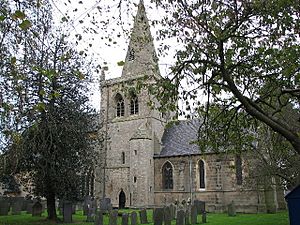Church of St John of Beverley, Whatton facts for kids
Quick facts for kids Church of St John of Beverley, Whatton-in-the-Vale |
|
|---|---|
 |
|
| Denomination | Church of England |
| Website | The Cranmer Group |
| History | |
| Dedication | St John of Beverley |
| Administration | |
| Parish | Whatton-in-the-Vale |
| Diocese | Southwell and Nottingham |
| Province | York |
The Church of St John of Beverley, Whatton is an old and important church in a village called Whatton-in-the-Vale, Nottinghamshire. It is part of the Church of England and is named after a saint called St John of Beverley. This church is a "Grade II* listed" building. This means it is a very special historical building protected by the government.
Contents
The Church Building
A Look at History
This church is very old, first built in the 1300s, which is called the medieval period. However, much of the original church was changed during "Victorian restorations." These were big repair and rebuilding projects that happened in 1846, 1866–1867, and 1870.
Today, the church has a chancel (the area around the altar) that was rebuilt in 1846. It also has a central tower and a tall steeple, which were rebuilt in 1870. The main part of the church, called the nave, has aisles on its north and south sides, and porches at both the north and south entrances.
Old Architectural Styles
Only a small part of the church's original "Romanesque" style remains. This is an old style of building from around the 11th and 12th centuries. It can be seen in an arch that was once on the south side of the tower. During the 1800s, this arch was moved to the north side.
The nave, which is the main part of the church where people sit, is built in the "Early English" style. This style was popular in England from the late 1100s to the late 1200s.
Cranmer Chapel
Inside the church, there is a special chapel. It is dedicated to the memory of Archbishop Thomas Cranmer. He was a very important person in English history. Thomas Cranmer was born and grew up in Aslockton, which was a small village connected to Whatton at that time.
In this chapel, you can see two old stone carvings called "corbel heads." These carvings are from around the year 1300. They show King David from the Bible and an angel.
Special Features and Art
Inside the Church
The church has many interesting details. You can see the lower part of an old spiral staircase that is no longer used. There is also a special carved space from the "Decorated Gothic" period. This space holds a statue of a church leader who lived there between 1304 and 1310. You can also find a "piscina," which is a stone basin used for washing sacred vessels.
There are two old stone statues, called "effigies," in the church. One is from the late 1300s and shows a Knight Templar wearing armor. Knight Templars were famous medieval knights. The other effigy is from the early 1300s and shows a knight with his legs crossed. There is also a stone tablet that remembers Thomas Cranmer, the father of the famous archbishop. He was born in Aslockton in 1489.
Font, Windows, and Bells
The font, which is a large basin used for baptisms, dates back to 1662. One of the beautiful stained-glass windows was made in the 1800s. It shows Saints Peter and John with Jesus. This window was designed by Edward Burne-Jones, who was part of the "Pre-Raphaelite movement," a group of artists who wanted to bring back older styles of art.
The church has a set of eight bells that can be rung together. Five of these bells are very old. They were made by Henry Oldfield in Nottingham in 1590 and 1618. An early clock was put in the church in 1683 by a clockmaker named Richard Roe. This clock was later replaced in 1910.
Church Group
The Church of St John of Beverley is part of a group of churches called the Cranmer Group of parishes. This group includes:
- St Thomas's Church, Aslockton
- Church of St Mary and All Saints, Hawksworth
- Church of St John of Beverley, Scarrington
- St Helena's Church, Thoroton
- Church of St John of Beverley, Whatton
- St Mary's Church, Orston
See also
- Grade II* listed buildings in Nottinghamshire
- Listed buildings in Whatton-in-the-Vale
 | Janet Taylor Pickett |
 | Synthia Saint James |
 | Howardena Pindell |
 | Faith Ringgold |

